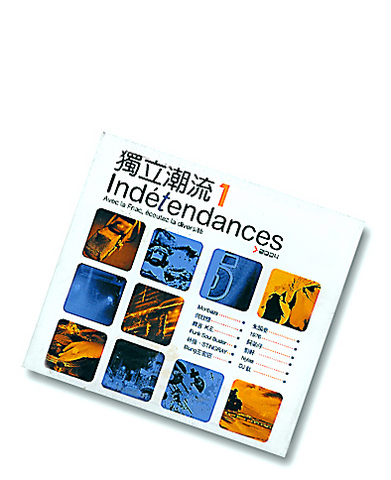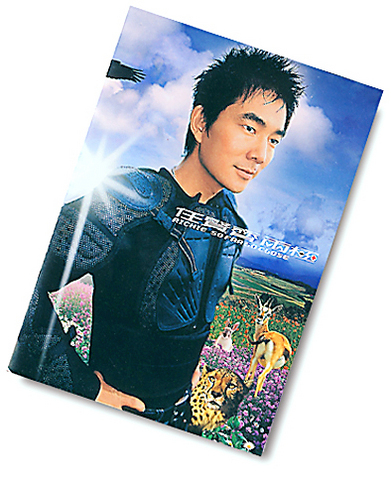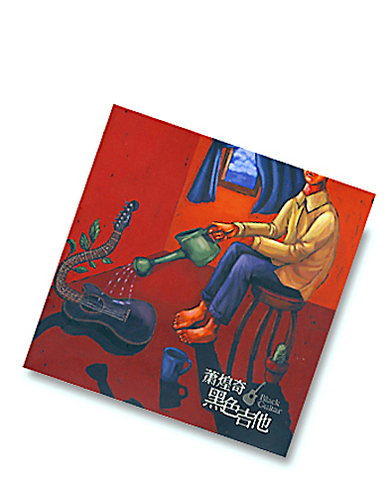The Heart of the Sun and the Moon
Wang Lee-hom

Sony

According to the liner notes on Wang Lee-hom's (
Wang may well have set out to, as he puts it, "create a new vibe the whole world can identify with as being Chinese," but the result is far from pleasing. The Heart of the Sun and the Moon is instead a rather odd and at times perplexing album on which Wang mixes up Mando pop standards and mild R&B / hip-hop with the odd sprinkling of traditional Chinese music.

The album gets off to an orthodox start with the pop / funk tune Open Your Heart" (放開你的心), which, apart from the odd strains of a traditional Chinese orchestra, certainly doesn't break any new musical boundaries. The album's title track follows in much the same vain as the opener and listeners could be forgiven for asking just what Wang's "chinked-out" is all about.

The closest any of the album's tunes come to answering this question is on Deep Bamboo Forest (
The bottom line is that fans of Wang may well find the manner in which he blends the odd sample into tunes enchanting and different, but those with a more open mind will simply be left "Wanged-out."
Indetendances
Various
FNAC
As a result of the popularity of FNAC's 2002 Indetendency series, which featured tunes by an eclectic collection of indie musicians and bands from Europe, the French-owned department store recently released the first in a series of CDs featuring some of Taiwan's leading indie acts.
Predominantly electonica-based with a sprinkling of standard alt rock / pop thrown in for good measure from more conventional acts like 1976 and Joy Topper (
While fans of many of the acts will have heard all the tunes before, those with a whim for discovering just what makes the local underground electronic music scene click should enjoy the feast of largely downbeat and ambient-inspired numbers.
Ambling in with Monbaza and a raw and -- it should be said -- rather annoying version of its jerky industrial-noise-based One Love (
Thankfully, Ciacia (何欣穗) and her laid-back bouncy pop anthem Make Each Other Happy (讓彼此快樂) follows the morbid opener and from this point on the compilation does its best to please.
Highlights of the 12-track CD include Funk soul Buster's interestingly ambient Sea Wave, Lim Giong (
So Far so Close
Richie Ren
Magic Stone
If it's pure and pompless Mando pop that your after, then you can't really go wrong with Richie Ren (任賢齊). For over a decade, Ren has been at the forefront of the music scene throughout greater China and it doesn't look like he's any hurry to pull the rip cord just yet.
He might look like an idiot decked out in a motor-cross safety vest on the gaudy cover art, which is certainly the worst album cover design this reviewer has seen in a very long time, but then who cares? This is, after all, Richie Ren and you always know where you stand when it comes to the Mando pop idol.
To his credit he's never bothered to dabble long with rap and has shunned the hip-hop fad that has swept through the Mando music scene. Instead, Ren has simply continued to do what he's unquestionably best at: producing and performing quality Mando pop standards.
The material on Ren's latest album will not surprise and will not shock. Tunes like the rock guitar-driven sing-a-long anthem Will Never Retreat (永不 退縮), the slow blues-influenced ballad Poles Apart (兩極), and the moody After Tomorrow (明天過後) will please Ren fans.
The album's highlight, however, is the unhurried pop/blues number Tears are Use (眼淚沒有用), which, while far from ground-breaking, is a classic Ren at his conventional best.
Black Guitar (黑色吉他)
Xiao Huang-chi (蕭煌奇)
Axis
Blind singer/songwriter Xiao Huang-chi (蕭煌奇) first hit the scene two years after the release of his debut You Are My Eyes (你是我的眼), on which he was joined by Taiwan's leading blind act and The Touch Band (全方位樂團).
The album may not have enjoyed huge chart success, but music industry insiders thought highly enough of it to nominate Xiao for Best Performance by a Male Musician and Best Songwriter at last years Golden Melody Awards.
Xiao didn't leave the award ceremony with a gaudy piece of gold to put on his mantelpiece, which is hardly surprising when you consider his major label opposition, but he certainly made his mark.
Xiao released his second longplayer on Christmas Day and from start to finish it is a great piece of work. Part folk, part eclectic collection of musical genres, Black Guitar is one of those rare albums that has something for everyone.
Don't be put off by the initial natty 1980s-style synthesized 12 seconds, as As Bright as Heaven (天若光) transforms itself into slow, winding, soulful Taiwanese ballad with a pleasing and memorable beat.
There's not a dud on the whole album, but some of the more interesting moments include the Latino-vide fueled and lounge-like Disorderly Dance (情亂舞) and the comedic and playful The Kid from the Yuan Family (阮家那兩個囝仔), a tune that sees Xiao toying masterfully with an off-center country western beat.
Need to succeed (一定要成功) is the highlight, however, with its spaghetti western-like barrage of brass, Ricky Martin-like Latino pulse and kick-ass surf-folk chorus.

May 26 to June 1 When the Qing Dynasty first took control over many parts of Taiwan in 1684, it roughly continued the Kingdom of Tungning’s administrative borders (see below), setting up one prefecture and three counties. The actual area of control covered today’s Chiayi, Tainan and Kaohsiung. The administrative center was in Taiwan Prefecture, in today’s Tainan. But as Han settlement expanded and due to rebellions and other international incidents, the administrative units became more complex. By the time Taiwan became a province of the Qing in 1887, there were three prefectures, eleven counties, three subprefectures and one directly-administered prefecture, with

Taiwan Power Co (Taipower, 台電) and the New Taipei City Government in May last year agreed to allow the activation of a spent fuel storage facility for the Jinshan Nuclear Power Plant in Shihmen District (石門). The deal ended eleven years of legal wrangling. According to the Taipower announcement, the city government engaged in repeated delays, failing to approve water and soil conservation plans. Taipower said at the time that plans for another dry storage facility for the Guosheng Nuclear Power Plant in New Taipei City’s Wanli District (萬里) remained stuck in legal limbo. Later that year an agreement was reached

What does the Taiwan People’s Party (TPP) in the Huang Kuo-chang (黃國昌) era stand for? What sets it apart from their allies, the Chinese Nationalist Party (KMT)? With some shifts in tone and emphasis, the KMT’s stances have not changed significantly since the late 2000s and the era of former president Ma Ying-jeou (馬英九). The Democratic Progressive Party’s (DPP) current platform formed in the mid-2010s under the guidance of Tsai Ing-wen (蔡英文), and current President William Lai (賴清德) campaigned on continuity. Though their ideological stances may be a bit stale, they have the advantage of being broadly understood by the voters.

In a high-rise office building in Taipei’s government district, the primary agency for maintaining links to Thailand’s 108 Yunnan villages — which are home to a population of around 200,000 descendants of the Chinese Nationalist Party (KMT) armies stranded in Thailand following the Chinese Civil War — is the Overseas Community Affairs Council (OCAC). Established in China in 1926, the OCAC was born of a mandate to support Chinese education, culture and economic development in far flung Chinese diaspora communities, which, especially in southeast Asia, had underwritten the military insurgencies against the Qing Dynasty that led to the founding of